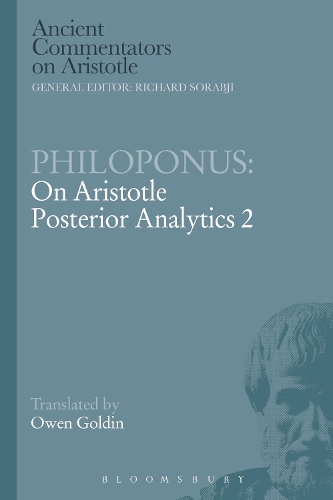
Philoponus: On Aristotle Posterior Analytics 2
(Paperback)
Available Formats
Paperback
Published: 26th March 2014
Hardback
Published: 1st November 2011
Paperback
Published: 26th March 2014
Paperback
Published: 26th March 2014
Paperback
Published: 26th March 2014
Paperback
Published: 26th March 2014
Paperback
Published: 26th March 2014
Paperback
Published: 26th March 2014
Paperback
Published: 26th March 2014
Paperback
Published: 26th March 2014
Paperback
Published: 26th March 2014
Paperback
Published: 26th March 2014
Paperback
Published: 26th March 2014
Paperback
Published: 26th March 2014
Paperback
Published: 10th April 2014
Hardback
Published: 1st April 2010
Publishing Details
Philoponus: On Aristotle Posterior Analytics 2
By (Author) Philoponus
Translated by Owen Goldin
Bloomsbury Publishing PLC
Bloomsbury Academic
26th March 2014
United Kingdom
Classifications
Tertiary Education
Non Fiction
Philosophy: logic
121
Physical Properties
Paperback
224
Width 156mm, Height 234mm
322g
Description
The Posterior Analytics contains Aristotle's philosophy of science. In Book 2, Aristotle asks how the scientist discovers what sort of loss of light constitutes lunar eclipse. The scientist has to discover that the moon's darkening is due to the earth's shadow. Once that defining explanation is known the scientist possesses the full scientific concept of lunar eclipse and can use it to explain other necessary features of the phenomenon. The present commentary, arguably ascribed to Philoponus incorrectly, offers some interpretations of Aristotle that are unfamiliar nowadays. For example, the scientific concept of a human is acquired from observing particular humans and repeatedly receiving impressions in the sense image or percept and later in the imagination. The impressions received are not only of particular distinctive characteristics, like paleness, but also of universal human characteristics, like rationality. Perception can thus in a sense apprehend universal qualities in the individual as well as particular ones. This volume contains an English translation of the commentary, accompanied by extensive commentary notes, an introduction and a bibliography.
Author Bio
Owen Goldin is Associate Professor of Philosophy at Marquette University, Wisconsin, USA.
